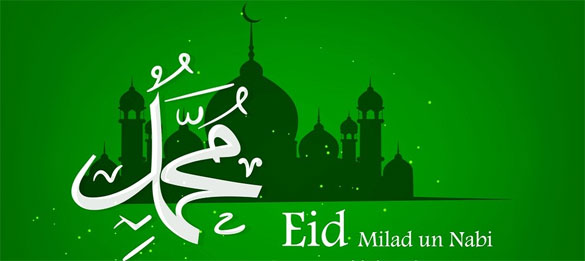New Age Islam Special Correspondent
29 December 2020

Christmas is celebrated as the birthday of Jesus Christ by the Christians all over the world. On Christmas Day, Christians assemble in churches and offer five prayers. They decorate the churches, light them up, set up Christmas trees and dress up as Santa Claus to entertain children and distribute chocolates and gifts among children in the streets. They visit friends and relatives and offer greetings and exchange gifts. This way they celebrate the birthday of Jesus the Messiah.
---------------------------------------------------------------------------------------
---------------------------------------------------------------------------------------
The entire atmosphere is peaceful and the message of love, peace and harmony rings in the air. There is no unnessary use of microphone or loudspeakers creating nuisance in the public. No public meetings are organised in streets to sing Christmas carols on loudspeakers and no full-throated speeches by Christian religious leaders and scholars on the greatness of Jesus Christ and Christianity and on the rule of Chrustianity in the world in the past are delivered. The Christmas celebrations are church based. So there is less noise on the streets. Even where tableaux are brought out, order, sobriety and discipline is maintained.
---------------------------------------------------------------------------------------
Also Read: Why Must Muslims Celebrate the Birth of Hazrat Jesus Christ (pbuh)
---------------------------------------------------------------------------------------
There is also no demonstration of ideological differences between different sects of Christianity. There are Catholic Christians as well as Protestant Christians. There are also Eastern Orthodox Christians and Oriental Orthodox Christians. They all celebrate the birth of Christ in their own way. No sect says that only their way of celebrating Christmas is right and all the others are atheists and infidels. No Christian religious leader calls the other sect infidels and non-believers on loudspeakers.
One important aspect of Christmas celebrations is its inclusiveness. The Christians have made it a universal festival by making a festival for all. They convey the message that Jesus was not for Christians but for the entire humanity not merely through hollow words or claims but through their deeds and attitude. Therefore, followers of other religions also join the celebrations.
---------------------------------------------------------------------------------------
Also Read: As Saudi Arabia Opens Up To Christmas Festival, Islamists Cry Foul
---------------------------------------------------------------------------------------
Now, when we look at the behaviour of Muslims during Eid Milad- un- Nabi, we find that their behaviour and attitude runs contrary to the spirit of Islam. The birthday of the prophet of Islam pbuh is celebrated as Eid Milad-un-Nabi on the 12th day of Arabic month of Rabi-ul-Awwal. In recent years, the day is celebrated with great enthusiasm, particularly in the Indian subcontinent. On the morning of 12th Rabi-ul- Awwal, processions are organised in the name of Prophet pbuh.
The processions are led by the local imams. Green flags on high poles moves with them. The procession is called Julus-e-Mohammadi (March of the Prophet). This procession has no historical precedence in Islam. That's why, a section of Muslims does not believe in this way of celebrating the Prophet's birthday. In the evening, public meetings are organised in every locality by the local cultural or religious organisations. In these public meetings, religious scholars give speeches on the life and teachings of Prophet Mohammad pbuh. The entire locality is decorated with colourful lights and green flags. Cassettes of Naat (poems eulogising the holy Prophet pbuh) are played in full sound during day and night causing inconvenience and trouble to the Muslims and non-Muslims of the locality. The public meetings more often turn into platforms for sectarian outpourings. The issue whether the Prophet pbuh was Noor (light) or Bashar (human being) is passionately discussed. The discussion passes over the head of the illiterate and semi-literate audience.
---------------------------------------------------------------------------------------
Also Read: Christmas in Pakistan: Urdu Newspapers Demonstrate Different Approaches to Christmas
---------------------------------------------------------------------------------------
In recent years, Naat cassettes are also filled with religious slogans. Between Naats, religious slogans like "Ya Rasullallah, Hum Aapke Liye Sar Kata Denge, Kafiron Ka Sar Qalam Kar Denge" are included which make the atmosphere acrimonious and tense. God called the holy Prophet pbuh, Rahmat-al- lil Alameen (comforter) and the Prophet pbuh himself preached love and harmony but the essence of Islamic teachings that is love and harmony is missing from these celebrations.
Nowadays, loudspeakers have become an integral part of Muslim festivals. No religious event is considered complete without the use of loudspeakers. Poems, speeches and religious songs are played in full volume in violation of laws causing discomfort and inconvenience to all, especially the sick. A lady who is a social worker says that during Eid Milad-un- Nabi, she has to shift to another place because she has heart problems and the high decibel sound makes her sick.

Muslims repeatedly claim that Islam is a religion of peace but their behaviour negates their claim. The true Islamic spirit is missing in their behaviour. Festivals and other religious events of Muslims have become an occasion of outwardly demonstration of piety. In recent years, some sincere Muslims and Muslim organisations have started distributing gifts and sweets to people on Eid-Milad-un-Nabi but this practice has not become a universal part of Eid-Milad-un-Nabi celebrations.
New Age Islam, Islam Online, Islamic Website, African Muslim News, Arab World News, South Asia News, Indian Muslim News, World Muslim News, Women in Islam, Islamic Feminism, Arab Women, Women In Arab, Islamophobia in America, Muslim Women in West, Islam Women and Feminism

No comments:
Post a Comment